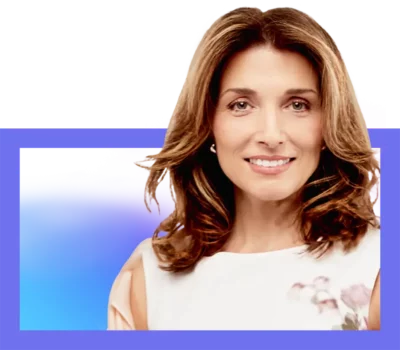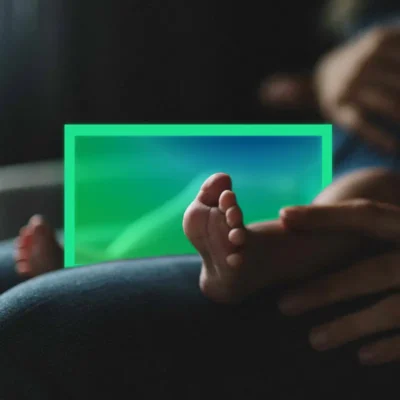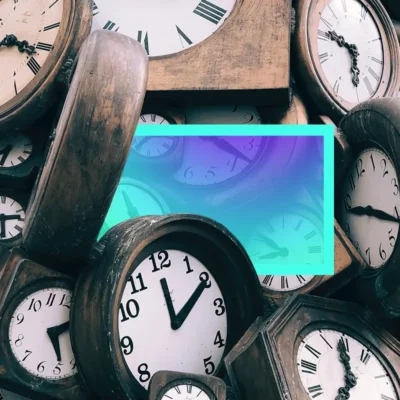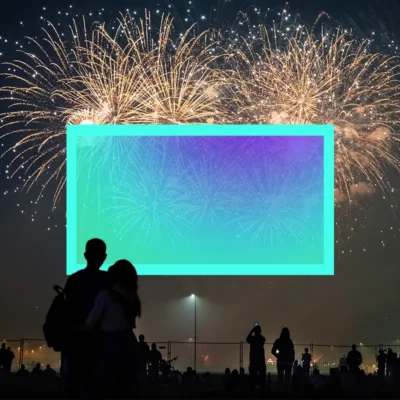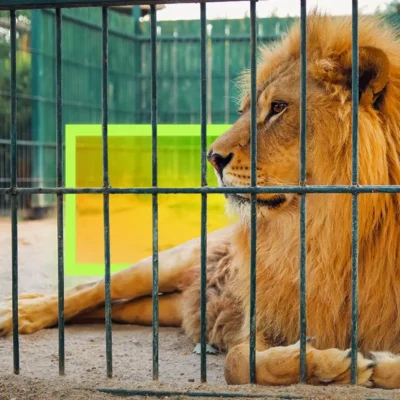A funny rush of surprise
Gordana Biernat grows up in a household full of mayhem and darkness. But there’s one saving grace: her grandfather, who spins legendary stories of the quirky folkloric magic he sees all around them. In today’s Meditative Story, Gordana talks about reopening herself to the unseen and the “funny rushes of surprise” she encounters all around her when she stops dodging fear and starts seeking new chances to grow.
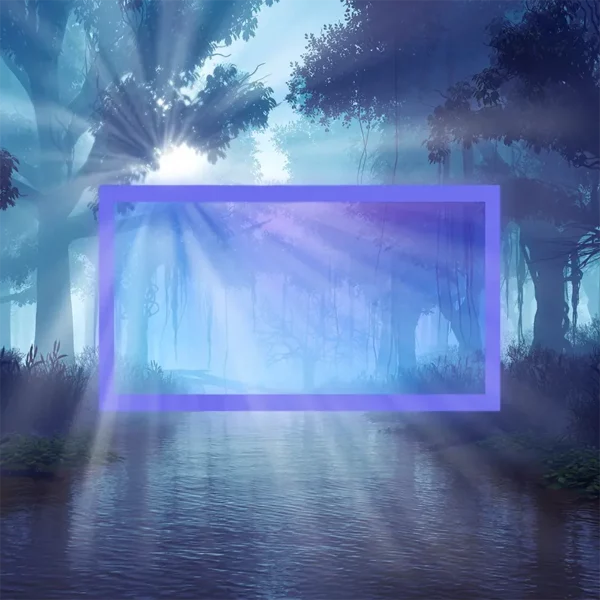
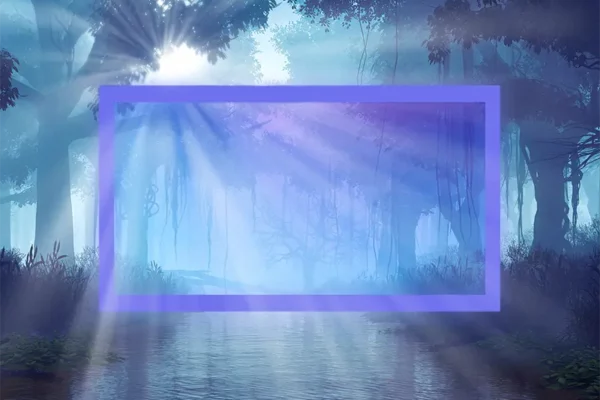
Table of Contents:
Transcript:
A funny rush of surprise
GORDANA BIERNAT: The stories I read in the pages of these books feel like secret messages to me.
I get lost in Little House on the Prairie. I’m especially drawn to the father in the story. One of the many imaginary fathers I collect from pages of the books I read and the movies I watch.
My mind is like a vision board where I keep pinning things up.
ROHAN GUNATILLAKE: As a small child, Gordana Biernat loves to spend time with her grandfather who tells stories of the folkloric magic he sees in the trees and meadows in a tiny Serbian Village. It’s a stark contrast to her own home, a place ruled by control and where the unknown is feared. Gordana realizes that to fight against that fear she must learn to open herself to unseen possibilities — and when they show up, to embrace them.
In this series, we combine immersive first-person stories, breathtaking music, and mindfulness prompts so that we may see our lives reflected back to us in other people’s stories. And that can lead to improvements in our own inner lives.
From WaitWhat, this is Meditative Story. I’m Rohan, and I’ll be your guide.
The body relaxed. The body breathing. Your senses open. Your mind open. Meeting the world.
BIERNAT: I stroll hand in hand with my grandfather in the meadow behind his house. We’re in the tiny village of Paljane, Serbia.
The ancient trees cast long shadows in the late afternoon. Their leaves whisper in the warm breeze. To grandfather, these trees are sacred; they’re alive. We talk to them.
From time to time, I look up at him as we head into the forest. The brilliant blue sky acts as a backdrop behind him, framing his face, his soft white beard.
He’s not tall, but he towers above me; I’m only 6. I meet his kind eyes. I trace the deep wrinkles in his face. As we walk together, I don’t see him as old. I see him as my friend.
Grandfather has no formal education, but he’s the wisest man I know. He moves slowly, not a hurry in the world. A farmer for many generations, his weathered hands reflect his deep connection to land. He knows everything about this place.
As we continue our walk, my ears tune into the sound of running water. We come upon a crystal clear mountain stream. I can see every single stone on the stream bed.
Grandfather loves to tell me stories about the unseen world. Things that are beyond the realms of our senses. Today, he tells me about “vilas,” sublime wild fairies that dance upon the lakes. My eyes widen. He reminds me: “Once they reveal themselves it’s important to observe them from a distance. Admire their beauty without disturbing them, like all things in nature.”
The only time I’ve heard about these unseen creatures till now is from my aunt. For the first six years of my life, I have lived with her in Serbia. My parents work in a factory in Sweden. They can’t afford care for me during the day, so my aunt raises me. I see my parents once a year on their summer visits. One evening my aunt invites a fortune teller home. While pretending to sleep I overhear her say there are vilas dancing around my bed. Dancing around my bed? It triggers a terror in me. My aunt sews a whole nutmeg into my pillow for protection. To my aunt, the unseen, the unknown is nefarious — a clear cause for concern.
But the way grandfather talks about the spirits doesn’t make me scared. To him, they’re just a part of nature. There’s nothing to be afraid of. He embraces the unseen. Grandfather seeds the idea that there are things that I can’t yet see in my life, but if I’m present and patient, they’ll show up. And I shouldn’t be afraid of them.
I feel a rush of surprise wash over me as I anticipate my first encounter with the vilas.
He releases my hand and snaps off a wooden vessel he’s been carrying in his belt. It’s old, smooth, handmade.
He dips it into the water, and hands it to me to drink from. The water is ice cold, the sweetest I’ve ever tasted.
I’m captivated by how the water flows through the stream. It’s fearless.
Grandfather tells me the same is true about love. Love is the stream that flows freely into all areas of life. We will always find it as long as we are open to it. In the wrestling between love and fear, there’s always a choice. As the sun dips my grandfather turns to me.
“Today will be the last day you see me.”
I know this already. I’m moving to Sweden to live with my parents, and I’m here to say goodbye. I dread leaving. The thought of it turns my stomach upside down.
“It’s my time to leave, and we’ll not meet again.”
There’s something so final about the way he declares this. A pain washes over me. He’s healthy. Vibrant. It’s like he knows something, but I can’t imagine what. I nod my head and take my seat beside him. We watch the water. We don’t speak.
I put my head on his shoulder and close my eyes. I imagine the vilas dancing. Observing them from a distance, floating and dipping.
A few months later my grandfather dies from a stroke. It’s been six months since I moved with my family to Sweden, and I’m devastated.
Grandfather’s stories create a connection for me to the unseen world. He shares a powerful truth I carry into my life: we can’t see everything, so be open.
GUNATILLAKE: Who in your life encourages you to be open? Where are they now? In tribute to them, embody the openness you feel in their presence.
BIERNAT: I slip out the front door and carefully close it behind me, silently praying it doesn’t make a sound. I am 11 years old.
I have to make this quick. I only have a minute or two before father realizes I’m not in the house anymore.
I run to the grassy area by the sidewalk and pluck a few small flowers. Once I’m back inside, I place the flowers in a miniature vase and put them by my bedside.
I lay in bed that evening soaking up the sight and smell of the flowers before I fall asleep. They’re bright, yellow, and alive.
They’re small, but they’re here, combatting the darkness and mayhem father constantly creates in this house.
We live in an old house in the middle of Malmö, a big coastal city on the southern coast of Sweden.
I no longer live anywhere close to nature, and I’m not always allowed to go out and play.
I’ve never had anyone bark orders or try to control me like father does. If I start to express my opinion about anything, he glares at me to quiet down. I’m constantly running his errands, like fetching his cigarettes from the store.
I try to forge some kind of independence, but father is masterful at holding my resistance against me. His temper, his tantrums, are followed by a silent treatment that lasts for days, sometimes weeks. Eventually, he wears me down to submission.
I learn what I need to do to please him, so he won’t carry his anger to my brother and mother. I learn to read his face, to understand how not to agitate him. I’m constantly dodging fear.
The irony is: my father once sought his own independence. Long ago, he decided he didn’t want to farm the family land. He had an urge to explore the world — not to be rooted in one place. He didn’t want his future to be controlled. I recognize myself in him when I think about why he left.
But now, he fears anything in his life that feels out of his control, including me.
I think back to what my grandfather said, about being “open to the unseen.” But how can I be open when I have so many reasons to be afraid?
My bedroom is a really small space. I pull out the stack of books from beneath my bed and lay them out on top of the covers. This is something my father can’t control, no matter how much he tries. He especially hates when I read books written in English because he doesn’t understand the language. “These books are part of my English lessons,” I lie.
The stories I read in the pages of these books feel like secret messages to me.
I get lost in Little House on the Prairie. I like to imagine they’re my real family. I’m especially drawn to the father in the story. One of the many imaginary fathers I collect from pages of the books I read and the movies that I watch.
My mind is like a vision board where I keep pinning things up to hold me through the storm that my father creates. One day, I’m going to leave this place. One day, I’m going to have a profession where I can be surrounded by books. My whole desk will be filled with books, and he won’t be able to do a thing about it.
I close the book and lay it on my chest as my eyes grow heavier. I imagine being far away from this place. I can’t yet see everything that will unfold for me, but it’s out there, somewhere past the breaking dawn.
One evening, I’m grounded, laying in bed. My parents watch Singin’ in the Rain in the living room. I’ve seen it many times before, and I start singing along in my mind. Once the movie stops, my mind’s still active, and I have trouble falling asleep.
I get out of bed and move to the window. It’s a cold February night. The air is crisp, and the night sky is filled with stars. My mind drifts to think about the vastness of the universe. I try to imagine where its boundaries are, its outer rim. I close my eyes, and somehow I still see the stars as clearly as I could picture a movie playing in another room. I open my eyes, and I see stars. I close my eyes, and I see stars. And I realize there’s no difference between what’s out there and what’s in my mind. My mind is infinite, and so is the universe. My mind and the stars are all made from the same stuff.
And just as when I stood by the stream with my grandfather, I feel a funny rush of surprise at my connection to the world around me.
My father gives me reason to be afraid, but instead, I find an urge to go into the darkness and look at the world from a place where I’m not afraid of the unknown.
GUNATILLAKE: We all have parts of our lives where we’re seeking a change. Not knowing where this change may come from can be scary. Be patient, be present. And when the possibilities do show up, you’ll be ready for them.
BIERNAT: The salon smells like hair products, full of chemicals. People carry on loud conversations over the whirring hairdryers. The phone doesn’t stop ringing. There’s a steady sound of scissors snipping all day long.
When I decide to study economics in school without seeking my father’s approval, his punishment is to choose my profession.
My independence frightens him, it needs to be managed. He looks at me growing into my own person the way my aunt looks at the vila’s that danced around my bed as a child — something to ward off.
He wants me to work surrounded by women to protect my future husband from feeling jealous. He fears if I’m unmarried the neighbors will see him as unworthy. I fear that I’ll never leave our house. I’ll be controlled for the rest of my life. First by him, and then by my husband? I know I can’t live like that.
The ladies who work at the salon are a team. They invite me to go out, socialize, have a drink after work. I can’t join them because of my circumstances at home. They sense working here isn’t my choice. My secrets create distance.
I’m styling a client’s hair when a man walks into the salon for the first time. His features are striking. Dark hair, crisp eyebrows, sharp nose. He has shorts, sneakers, and a jumper on. He’s dressed to play tennis. For some reason, my heart jumps and whispers: “There he is.” My attention shifts back to my client, and when I glance back up, he’s gone.
At the end of the day, I wash my hair. I don’t bother to blowdry it, so it fluffs up big and curly. I look like Donna Summer. I almost never wear my hair like this. But no matter. I don’t have any big plans for the day.
I check my schedule one last time before heading home and notice I have one more appointment.
The name GREGOR is written in big letters across my schedule in the 4 p.m. time block. I lift my eyes, and there he is, standing right in front of me. Him.
I’m clear, we have rules at the salon, everyone that’s going to have a haircut needs to have their hair washed. He insists he washed his hair right before coming. We start to argue. Colleagues and clients’ eyes start to fall on us. Not wanting to make a scene, he finally agrees, flashing a warm smile.
I’m nervous as I put him in my chair and begin washing his hair. I can’t stay focused. I keep sneaking glances at him from beneath my elbow. Up close, his chiseled chin looks straight out of a comic book, like Superman. It feels electrifying. I barely remember how to cut hair.
Once done, he asks me: “What are you doing Saturday night?” The shop is suddenly so quiet. Like everyone in the room waits for my answer. And then I feel that same funny rush of surprise. At that moment, I realize that anything can happen. Life can change in a split second. New chances can arise that you didn’t even know existed. But when they show up, you can’t be afraid; you have to be willing to take them.
In the salon, I’m firm, “I don’t date clients,” I say to Gregor.
But then, I write down my home number and slip it to him.
A few days later, we go out for the first time. By the end of the evening, we’re holding hands.
The day I move in with Gregor — without marrying — is the day my father says I’ve died. When his neighbors ask, “Where’s your daughter?” He says, “I have no daughter.”
But I don’t let that stop me. The life I build with Gregor contrasts greatly to the life I’ve known. We let ourselves be open to new experiences. We embrace the unexpected.
One morning, I have an urge to go to the beach despite the rain. It still takes me time to get used to the idea of not having my every thought questioned, my every decision scrutinized. But Gregor jumps at the idea of our trip, rain be damned. We set off in the car, and by the time we arrive, the clouds clear. We soak in the warm sunshine.
My life begins to fill with such experiences. Gregor and I steal a moment to sip champagne at 11 o’clock on a Wednesday morning. Nobody does that. It’s previously unimaginable. All these small delicacies feel like abundance to me after a life suspended by fear. As my perspective shifts, unseen magic suddenly becomes visible all around me in my day-to-day life.
I step out of our home and take in the beauty of an apple tree in our garden. I can tell something is changing — from the inside out — about this tree. A branch is about to push leaves out. A transformation is taking place, though you can’t yet see it. A few weeks later, there’s a flower. A few weeks after that, there’s a little bud. And then a few weeks after that, I hold an apple in my hand.
Take away the dimension of time, and you have magic — right in front of your eyes.
I make apple pie to enjoy with Gregor and our son Hubert.
It’s literally magic how things pop up in this world, going from nothing to something, from a budding branch to apple pie baking in the oven.
It’s this kind of magic that I was closed off to for so many years under my father’s influence. Like my grandfather always alluded to. I just need to be patient and present when it shows up.
I step on the soft green carpet in the library in my new home. This is my sanctuary. The ceiling-to-floor shelves are lined with books that explore everything from art to mystical subjects. Stepping into this space has become a ritual for me. In Swedish, we call it Egen Tid — “my own time.”
I plant myself in front of the warm fire and begin to write. I think back to my grandfather and how he gave me the courage to realize that what is unseen doesn’t have to be unsafe. As I sit here writing, I think about the vilas dancing in the distance. And I open myself up to the next rush of surprise that might come my way.
Rohan’s closing meditation
GUNATILLAKE: There are several delicate threads that weave through Gordana’s story. And the ones I want us to hold onto for our short closing meditation together are that of patience — of waiting for that which is magical to reveal itself. And that of how we relate to the unknown and the strange.
How do you relate to the unknown and to the strange?
Do you actively go out to seek it, or do you prefer to stay comfortable and in the world of that which is familiar?
There’s no right answer here.
It’s entirely natural to want to stay warm and cozy. To say, “No, no thanks” to that which is not known, other, beyond where we feel comfortable. I do it all the time.
So something I actively work on, is saying yes more. In my relationships, in my practice. So how about we do a yes meditation? (I’ll assume you said yes.)
Letting the body be soft. Gentle upon the earth, not a burden. Turning inwards, just for now. Slowing down.
Letting go of any busyness that might be kicking around. Letting it go. And knowing you’re letting it go because the body is softening.
Face, hands: Soft and light.
And what we’ll do is sit and wait. And when something new arises in our experience, we say yes. Turn to it, know it, welcome it. Be interested in it. It could be a thought, a sensation, an idea, a sound, only you’ll know. But it’s something new to be discovered.
So when it arises, turn to it. The alchemy of awareness turning the unknown into the known. And when that thing becomes less prominent, dropping back, and waiting again for the next thing.
Being like this for a little bit. Being open. Interested. And saying yes to whatever knocks on the door of our attention.
Ok. And now resetting and waiting again. Not knowing what we’re waiting for. But when it does arise, turning to it.
Only when we are quiet might the vilas be seen. Only when there is softness in the mind, curiosity, and stability will they grace us with their dances, confident that they are safe from our interference.
Let’s keep this intention fueled, shall we? For the rest of today, tomorrow, and beyond. To practice waiting, welcoming, and wonder.
So thank you again Gordana, and thank you.

